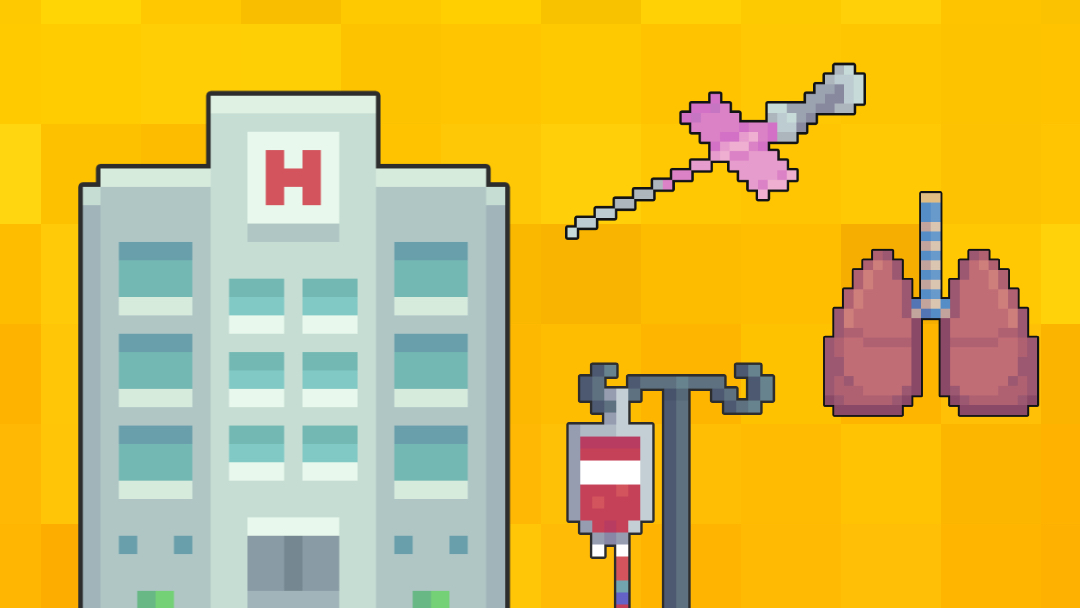- 📖 Geeky Medics OSCE Book
- ⚡ Geeky Medics Bundles
- ✨ 1300+ OSCE Stations
- ✅ OSCE Checklist PDF Booklet
- 🧠 UKMLA AKT Question Bank
- 💊 PSA Question Bank
- 💉 Clinical Skills App
- 🗂️ Flashcard Collections | OSCE, Medicine, Surgery, Anatomy
- 💬 SCA Cases for MRCGP
To be the first to know about our latest videos subscribe to our YouTube channel 🙌
The prospect of being let loose on the wards after years of lecture-based learning can be daunting. It’s an amalgamation of excitement, nervousness and uncertainty as to what to expect, and there is a great deal of self-directed learning and motivation needed to keep atop it all. With all this going on in the background, it can be a struggle trying to work out where to begin. My past year on placement has proved insightful, and I thought I would create a little guide to share what has worked for me and some tips on how to make the most of your placement.
Show an interest
Doctors want to teach enthusiastic students who are open-minded and willing to learn. Make sure that you are active in the first few weeks of your placement and introduce yourself – not just the doctors, but the nursing staff and ward clerks too. The ward is going to be your home for the next few weeks, make sure everyone knows who you are!
If you are placed in a specialty that you have a particular interest in, it would be worth contacting your consultant supervisor a week or two before you arrive – let them know that you are curious about their specialty and enquire about potential quality improvement projects, audits or research that you could get involved with.
Find your supervisor/tutor’s timetable
This can be a little difficult as not all trusts make them easily accessible, but if you can, try and get hold of the staff rota. You’ll be able to see who is on-call and which clinics/theatres are running, and it can help you come up with a plan of what you’d like to experience that week.
Put yourself forward
During my first placement, I often shied away from performing procedures such as venepuncture and ABGs, due to fears that I might do it incorrectly, or hurt the patient. It wasn’t until my SHO turned to me during a ward round and had me examine a patient and present my findings (to an entourage of six!) that I truly appreciated the benefit of pushing myself out of my comfort zone. It was an invaluable experience and felt just like an OSCE. In our debrief afterwards, I was provided with some excellent feedback and the opportunity to reflect and critically appraise myself. I have since started volunteering to perform all sorts of clinical procedures and examinations and have found my confidence grows each time.
As medical students, we often strive for perfection – which isn’t necessarily a bad thing. Just remember that in order to achieve perfection, practice is a must. Take every opportunity to practise your skills and become comfortable with being uncomfortable, because that is where your growth truly lies.
Make friends with the junior doctors
The juniors are the best people to talk to on the wards regarding… anything, really! They’ve just come out of medical school and know exactly what you’re experiencing – take the opportunity to learn from them. As well as medical knowledge, I’ve also had some excellent discussions about career planning and life in general and have found some incredibly inspiring mentors and role models along the way. Placement is an excellent opportunity to start reaching out and forming your network – remember, you may very well be working alongside these doctors in a few years’ time!
Go in with a plan
Every day, decide what it is you want to learn, formulate a plan, and see it through. I had a fantastic FY1 who would point me towards patients with the signs I wanted to see or would take the time to work through X-rays and ECGs with me. Use your time on the wards to practice your history taking and clinical skills, and familiarise yourself with what is normal and what is not. If you want to practice your presenting skills, offer to clerk a patient and then ask a doctor if you can present to them. Make it an aim to learn just one new thing every day, and try to gain feedback from all that you do.
Try to find good in low-yield learning environments
Inevitably, you’ll end up in some situations which don’t feel the most productive and you’ll look up at the clock after what feels like an hour to find only three minutes have passed. Still, there are many learning opportunities to be had – observe how the clinicians communicate with their patients and ask yourself how you would lead the consultation differently. Offer to prepare notes and present the NEWS chart. If you see an interesting patient whilst on the ward round, hang back and practise your history taking. Remember that you are in charge of your own learning – your placement is what you make of it.
Board rounds – although tedious, these can be helpful in getting to know the patients on the ward. Try and obtain a copy of the ward list and as patients are being discussed, note down who would be interesting to see – is there a heart murmur you could listen to, or a hernia you could examine?
Have back-up plans
I would definitely recommend taking some time in your first week to explore. Go to different wards and introduce yourself, spend half a day here and there and really get a feel for the hospital. Therefore, if you ever feel like your time is not being spent wisely, you know who/where you can go to ensure your day is more productive.
Go on-call
On-calls can provide fantastic learning opportunities. There are less staff around and you get a chance to fully appreciate the hospital out of hours, as well as learning more about the importantance of prioritising and organisation.
Be comfortable with doing things alone. Whilst you might be paired up with a ward partner during your time around the hospital, consider taking full advantage of on-call shifts by going solo and learning from a one-to-one experience with the on-call team.
Go to the junior doctor teaching
Most trusts have their own teaching programmes for their junior doctors – find out if it would be okay for you to go along to some of the sessions. Most of the lectures I’ve been to have been pitched at a really understandable level and have then built in elements of clinical practice to help aid application of the science we’ve been learning throughout medical school.
Look after yourself
The most important point – look after yourself. It is not uncommon to feel out of your depths and overwhelmed with imposter syndrome at times, and I’d suggest taking at least one or two evenings off per week to simply relax and reconnect with the person that you are when you aren’t a medical student.
Remember that you are not alone – speak to friends and family for support. Speak to doctors for advice on how they kept sane through medical school. Speak to your educational supervisor or pastoral/academic support at university. Make an appointment with your GP if needed.
Enjoy your clinical years – they truly are the best part of medical school. Become a ‘yes’ person and seize any opportunity that comes your way. It might feel a little uncomfortable at first, but that’s simply because it’s a new experience. Go ahead; adventure awaits.




